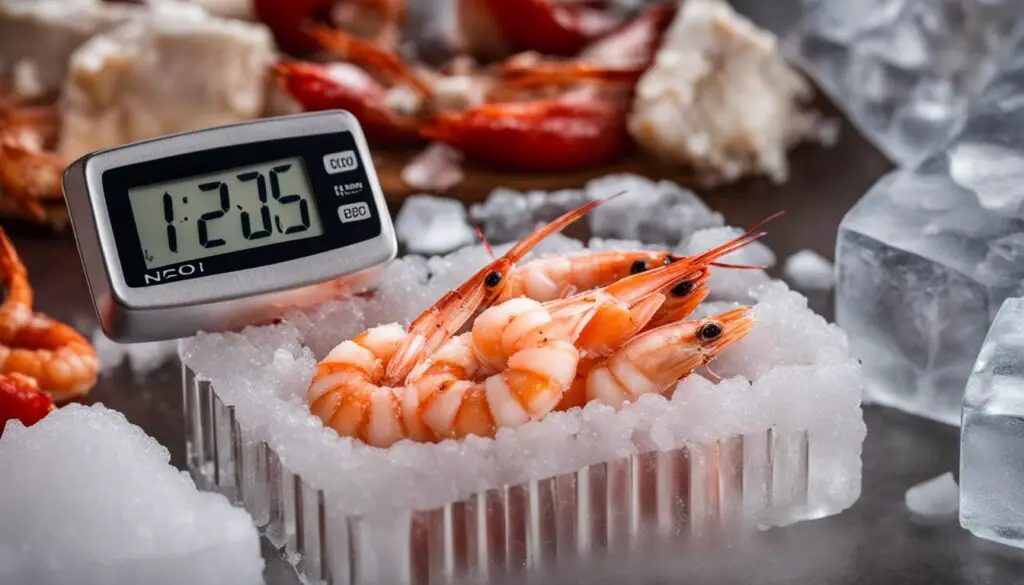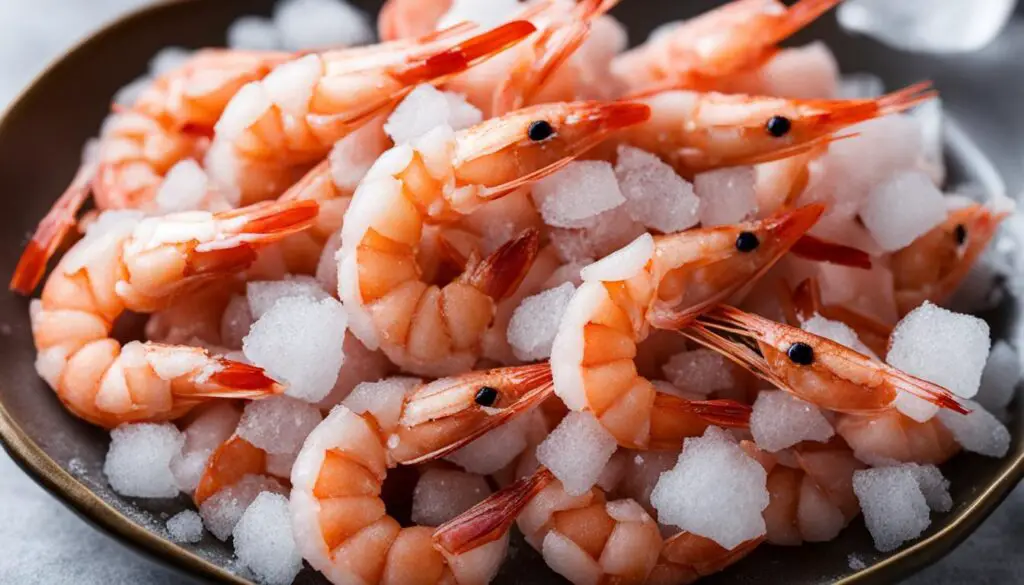Do you ever find yourself with a surplus of shrimp and wonder how long you can freeze them for? Well, you’re in luck! In this article, we’ll uncover the secrets to preserving the freshness of shrimp while frozen. Whether you’ve cooked the shrimp or they’re still raw, we’ve got you covered with expert tips and guidelines.
Key Takeaways:
- Shrimp can be frozen for up to 3-6 months while maintaining their quality and taste.
- Proper storage in airtight containers or freezer bags is essential to prevent freezer burn and dehydration.
- Cooked shrimp can be frozen for 3-6 months, while raw shrimp can also be frozen for the same duration.
- Thaw frozen shrimp in the refrigerator or under running water to ensure their safety and freshness.
- Investing in a reliable chest freezer can further extend the shelf life of frozen shrimp.
Freezing Cooked Shrimp
When it comes to freezing cooked shrimp, proper preparation and storage techniques are essential to maintain its flavor and quality. Follow these guidelines to freeze cooked shrimp effectively:
- Start by removing the shells and tails from the cooked shrimp.
- Boil the shrimp for approximately 10 minutes to eliminate bacteria and residual shell pieces.
- Next, lay the cooked shrimp in a single layer on a baking sheet.
- Place the baking sheet in the freezer and allow the shrimp to freeze until firm.
- Once the shrimp is fully frozen, transfer it to large freezer bags.
- Remember to remove as much air as possible from the freezer bags to prevent freezer burn.
- Label the bags with the date of freezing for easy tracking.
- Frozen cooked shrimp can be stored for a duration of 3-6 months, ensuring its longevity without compromising taste.
By adhering to these freezing guidelines, you can keep your cooked shrimp fresh and ready to be enjoyed in various culinary delights at any time.
Freezing Raw Shrimp
When it comes to freezing raw shrimp, proper techniques are crucial to maintain their quality and taste. Follow these shrimp freezing tips for optimal results:
- Leave the shells and veins intact as they help protect the shrimp during freezing and prevent moisture loss.
- Rinse the shrimp under cold running water to remove any debris or impurities.
- Place the raw shrimp in a rigid container or freezer bag, minimizing the amount of air inside to reduce the risk of freezer burn.
- Prepare a simple brine solution by dissolving salt in water. Pour the brine over the shrimp in the container, ensuring that the shrimp are submerged.
- Label the container with the date of freezing to keep track of its shelf life.
- Freeze the raw shrimp within 1-2 days of purchase or preparation to preserve their freshness.
By following these steps, you can freeze raw shrimp effectively, allowing you to enjoy their delicious taste even after several months in the freezer.

Thawing Frozen Shrimp
Thawing frozen shrimp properly is essential to maintain their quality and taste. Here are two recommended methods to thaw shrimp:
Method 1: Thawing on the Kitchen Counter or in the Fridge
- Transfer the frozen shrimp to a colander placed in a bowl to catch any drips.
- Place the colander on the kitchen counter or in the fridge to thaw.
- Allow the shrimp to thaw for a few hours or overnight depending on the quantity.
Thawing shrimp at refrigerator temperatures ensures a gradual thaw, preventing any harmful bacterial growth. Once thawed, cook or refrigerate the shrimp within 1-2 days to maintain their freshness and flavor.
Method 2: Thawing Under Running Water
- Place the frozen shrimp in a sealed plastic bag.
- Fill a large bowl with cold water.
- Submerge the sealed bag of shrimp in the water, ensuring it remains airtight.
- Let the water run at a slow, steady stream, allowing it to thaw the shrimp.
- Continue running water until the shrimp thaws completely, typically within 15-30 minutes.
Thawing shrimp under running water is a quicker method but requires constant attention. Remember to cook or refrigerate the thawed shrimp within 1-2 days.
Pro Tip: Avoid refreezing thawed shrimp, as it can affect the taste and texture. Aim to thaw only the portion you plan to use to maintain shrimp quality.
| Method | Thawing Time | Advantages |
|---|---|---|
| Thawing on the Kitchen Counter or in the Fridge | A few hours to overnight |
|
| Thawing Under Running Water | 15-30 minutes |
|
Extending Shrimp Freezer Life
Frozen shrimp can be stored for up to 3-6 months, but it’s important to note that the quality may start to decline after 3 months. To enjoy optimal taste, it is recommended to use the shrimp within this time frame. Proper storage techniques play a crucial role in maintaining the quality of frozen shrimp.
When storing frozen shrimp, it is advisable to use airtight containers or freezer bags. This helps prevent freezer burn and keeps the shrimp from dehydrating. To easily identify the contents and keep track of their shelf life, label and date the containers. This simple step ensures you know exactly how long the shrimp has been in the freezer.
Another crucial factor in keeping shrimp frozen is the freezer temperature. It is essential to maintain the temperature at or below 0°F. This ensures that the shrimp remains frozen, preserving its freshness and taste.
Shrimp Storage Tips:
- Use airtight containers or freezer bags to prevent freezer burn.
- Label and date the containers for easy identification.
- Maintain the freezer temperature at or below 0°F to keep the shrimp frozen.
By following these tips, you can extend the shelf life of frozen shrimp and enjoy its deliciousness in your meals for months to come.

| Storage Tips | Shelf Life |
|---|---|
| Use airtight containers or freezer bags | Up to 3-6 months |
| Label and date the containers | Up to 3-6 months |
| Maintain freezer temperature at or below 0°F | Up to 3-6 months |
The Best Chest Freezers for Shrimp Preservation
Investing in a chest freezer can greatly help in extending shrimp freezer life and maintaining shrimp quality in the freezer. Chest freezers offer ample storage space and can reach ultra-low temperatures, preventing freezer burn and maintaining the freshness of shrimp.
The temperature stability of chest freezers ensures consistent freezing conditions, protecting the shrimp from temperature fluctuations that can compromise its texture and taste. With the proper storage and a reliable chest freezer, you can extend the shelf life of shrimp and enjoy the taste of the sea whenever you desire.
Benefits of Chest Freezers for Shrimp Preservation
Chest freezers provide several advantages when it comes to preserving the quality of frozen shrimp:
- Ample Storage Space: Chest freezers come in various sizes, offering you the flexibility to store a large quantity of shrimp for extended periods.
- Ultra-Low Temperatures: Chest freezers can maintain extremely low temperatures, ensuring optimal freezing conditions for shrimp, preventing freezer burn, and maintaining their quality.
- Consistent Temperature: The temperature stability in chest freezers prevents temperature fluctuations, which can lead to the formation of ice crystals and affect the texture and taste of the shrimp.
By investing in a chest freezer, you can have peace of mind knowing that your shrimp is stored in ideal conditions for long-term preservation. It will remain fresh, flavorful, and ready to be used in a variety of delicious dishes whenever you need it.
Top Chest Freezers for Shrimp Preservation
When choosing a chest freezer for preserving shrimp, consider the following options:
| Model | Capacity | Temperature Range | Additional Features |
|---|---|---|---|
| 1. Example Brand X Chest Freezer | 10 cubic feet | -10°F to 0°F | Adjustable thermostat, energy-efficient design |
| 2. Example Brand Y Deep Freezer | 15 cubic feet | -13°F to 5°F | Fast freeze function, lockable lid |
| 3. Example Brand Z Freezer | 20 cubic feet | -20°F to 0°F | Interior light, removable baskets for organization |
These chest freezers provide the necessary features and capacities to accommodate your shrimp storage needs. Choose one that suits your requirements, ensuring optimal preservation of your frozen shrimp.
Conclusion
Freezing shrimp is an excellent method for preserving its freshness and extending its shelf life. Whether you have cooked shrimp or raw shrimp, both can be safely frozen and stored for 3-6 months.
When it comes to freezing cooked shrimp, it is important to remove the shells and tails before boiling them for about 10 minutes. Once cooked, lay the shrimp on a baking sheet in the freezer until firm, then transfer them to airtight freezer bags. This way, you can enjoy the convenience of having cooked shrimp readily available for up to 3-6 months.
For raw shrimp, it’s best to leave the shells and veins intact before rinsing them under running water to remove any debris. Place the raw shrimp in a rigid container, minimizing the amount of air within. Prepare a brine solution of salt and water to pour into the container to help preserve the shrimp’s quality. By labeling the container with the date, you can easily keep track of the frozen raw shrimp’s shelf life.
When thawing frozen shrimp, it’s crucial to do so safely. You can either transfer the shrimp to a colander and let it thaw on the kitchen counter or in the refrigerator. Another option is thawing the shrimp under running water. Once thawed, cook or refrigerate the shrimp within 1-2 days to maintain its quality.
By following proper storage and thawing techniques, you can maintain the superior taste and quality of shrimp in the freezer. So, whether you’re cooking up a quick shrimp stir-fry or planning an elegant seafood feast, your frozen shrimp will be ready to elevate your dishes with its delectable flavor.
FAQ
How long can shrimp be frozen for?
Shrimp can be frozen for up to 3-6 months while maintaining its quality and taste.
How should I store frozen shrimp?
Shrimp should be stored in airtight containers or freezer bags to prevent freezer burn and dehydration. Label the containers with the date of freezing to keep track of their shelf life.
Can cooked shrimp be frozen?
Yes, cooked shrimp can be frozen by removing the shells and tails, boiling them for 10 minutes, then placing them on a baking sheet in the freezer until firm. Once frozen, transfer them to large freezer bags, removing as much air as possible. Frozen cooked shrimp can be stored for 3-6 months.
How do I freeze raw shrimp?
To freeze raw shrimp, leave the shells and veins intact. Rinse the shrimp under running water to remove debris. Place the shrimp in a rigid container, limiting the amount of air. Prepare a brine solution of salt and water and pour it into the container. Label the container with the date and freeze the raw shrimp within 1-2 days. Raw shrimp can be stored in the freezer for 3-6 months.
How should I thaw frozen shrimp?
Transfer frozen shrimp to a colander and let them thaw on the kitchen counter or in the fridge. Alternatively, thaw the shrimp under running water. Once thawed, cook or refrigerate the shrimp within 1-2 days. Avoid refreezing thawed shrimp, as it can affect the taste and texture.
What is the optimal storage duration for frozen shrimp?
Frozen shrimp can be stored for up to 3-6 months, but the quality may start to decline after 3 months. It is best to use the shrimp within this time frame for optimal taste.
Can investing in a chest freezer help preserve the quality of frozen shrimp?
Yes, investing in a chest freezer can greatly help preserve the quality of frozen shrimp. Chest freezers offer ample storage space and can reach ultra-low temperatures, preventing freezer burn and maintaining freshness. The temperature stability of chest freezers ensures consistent freezing conditions, protecting the shrimp from temperature fluctuations.

